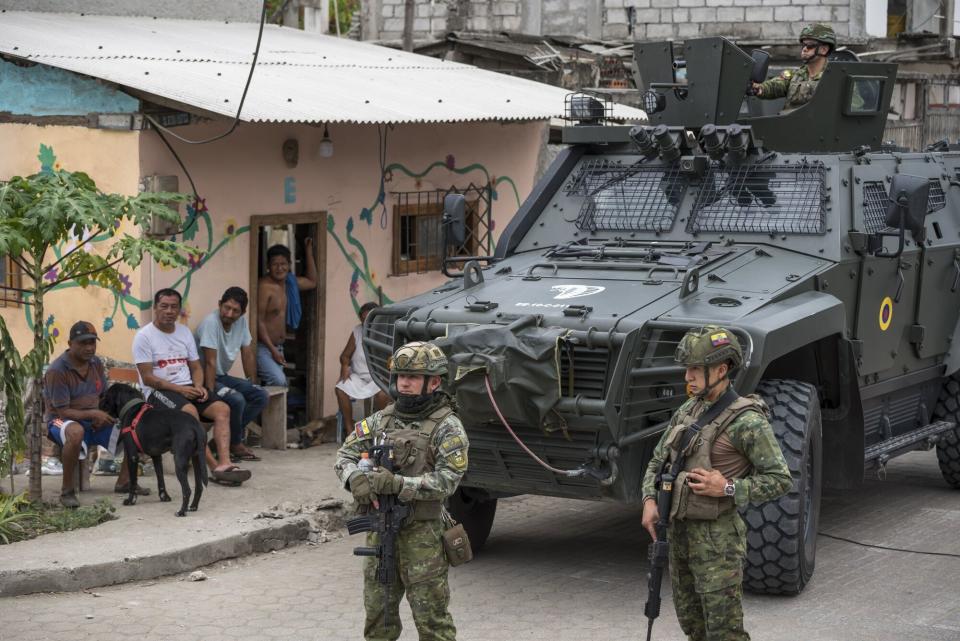Ecuador Bonds Jump as Voters Back Noboa’s Anti-Mafia Measures
- Oops!Something went wrong.Please try again later.
(Bloomberg) -- Ecuador’s bonds rose after voters approved a raft of security measures in a Sunday referendum, seen as the first key test of President Daniel Noboa’s push against drug violence that’s roiled the Andean nation.
Most Read from Bloomberg
Trump Has Only $6.8 Million for Legal Fees With Trial Underway
Billionaire Pinaults Fight to Pull Gucci Off the Discount Rack
Russians Transform Dubai as They Flee Putin’s War: Photo Essay
All nine of Noboa’s proposals to step up his war on cocaine cartels, including extradition for drug traffickers, passed easily, according to a quick count published by the electoral authority.
Bonds due 2030 jumped 1.6 cents to 52.8 cents on the dollar, leading gains in emerging markets Monday, according to pricing data compiled by Bloomberg. Notes due 2035 and 2040 also advanced more than 1.3 cents each.
The advance comes even as voters rejected by large margins market-friendly proposals to liberalize the labor market and allow international arbitration for foreign investors in the country.
While the referendum highlights resistance to economic reforms, the results show “strong overall support for President Noboa, consistent with pre-referendum polls indicating a 70% approval rating,” Ricardo Penfold, a managing director at Seaport Global in New York, said in a note to clients earlier Monday. “The main driver for his support is security and not the economy.”
The vote breakdown shows that Noboa is “still the frontrunner” in next year’s election, though the odds of a first-round victory have dropped, said Risa Grais-Targow, an analyst at Eurasia group.
Popularity test
The vote was the first hard test of Noboa’s popularity since he took office in November, and shows strong support for his anti-gang policies, which are key for his hopes of winning re-election. Still, defeat on the economic measures weakens his mandate to implement painful reforms if, as expected, a new deal with the International Monetary Fund is announced in the near future.
Read more: Ecuador Bonds Gain Most in EM as New IMF Deal Nears
Anticipation of a deal with the IMF is one of the drivers for Ecuador’s debt, which has returned about 60% to investors this year, the best among developing nations.
The rebound comes after the notes slumped in 2023 as the country went through an impeachment bid, the assassination of a presidential frontrunner and a sharp escalation of narco-gang violence.
Noboa, 36, saw his approval ratings soar when he declared a state of emergency and put the army on the streets to fight the organized-crime gangs that have made the nation of 17 million more violent than Mexico and Colombia.
While homicides have declined, the nation remains extremely violent. Almost 40,000 troops were deployed to provide security at polling stations and mayors of two mining towns in southwest Ecuador were assassinated within hours of each other just days before the voting.
Backing for Noboa’s other policies is more fragile, after he raised taxes despite having promised to cut them, and failed to fulfill a pledge to fix rolling blackouts.
Noboa, the US-educated son of wealthy banana exporters, won last year’s presidential election, but only to serve out the term of Guillermo Lasso which ends next year. The country holds another general election on Feb. 9.
The referendum took place amid an international crisis triggered when Noboa sent police into Mexico’s embassy this month to arrest a former vice president convicted of corruption. Ecuador’s violation of diplomatic protocols caused widespread international condemnation, but many locals rallied behind the government.
The results should give a boost to governability, but rejection of economic proposals shows there’s still “strong resistance to the structural reforms that Ecuador needs” and could mean Noboa has to reduce his fiscal ambitions in order to win the election next February, BancTrust & Co. wrote in a note to clients.
Most Read from Bloomberg Businessweek
How a Massive Hack of Psychotherapy Records Revealed a Nation’s Secrets
A Hedge Fund Billionaire’s Cash Helped Fund a ‘Predatory’ Lender
What Really Happens When You Trade In an iPhone at the Apple Store
Rents Are the Fed’s ‘Biggest Stumbling Block’ in Taming US Inflation
©2024 Bloomberg L.P.



